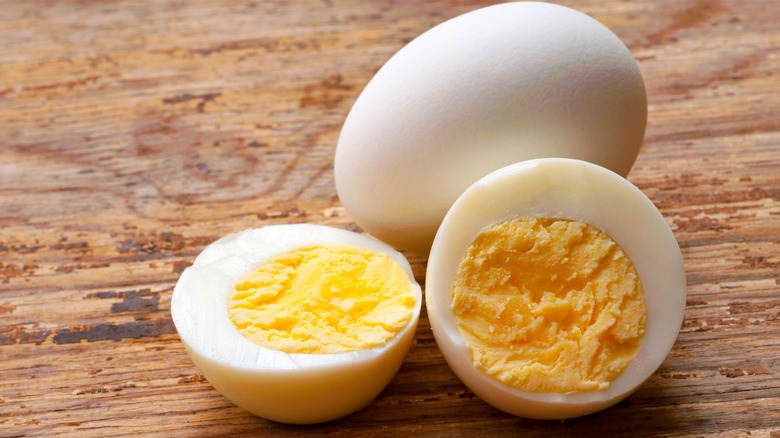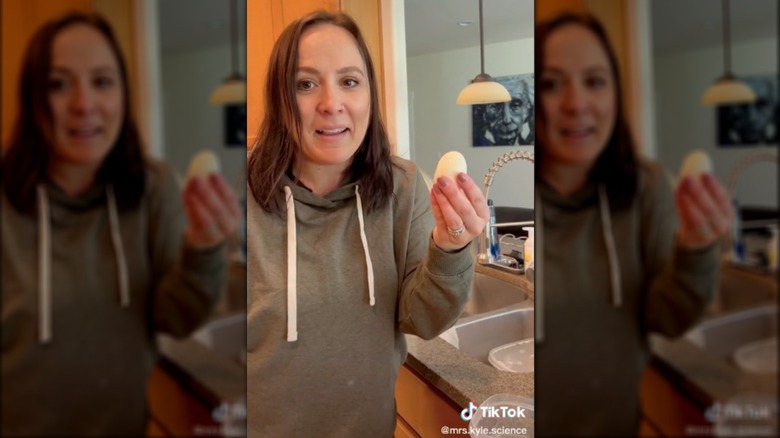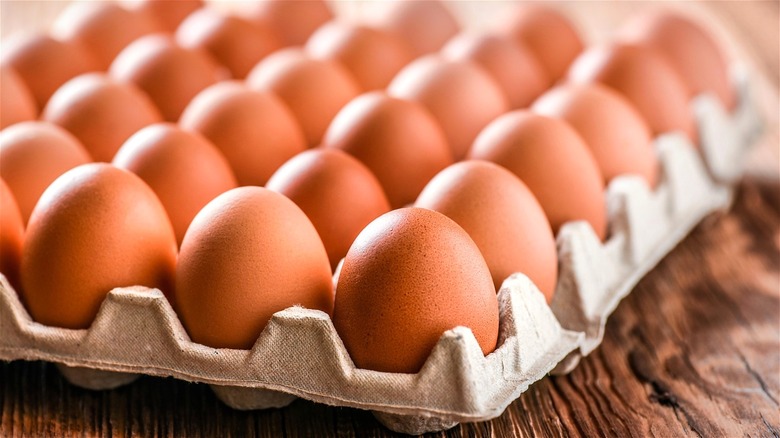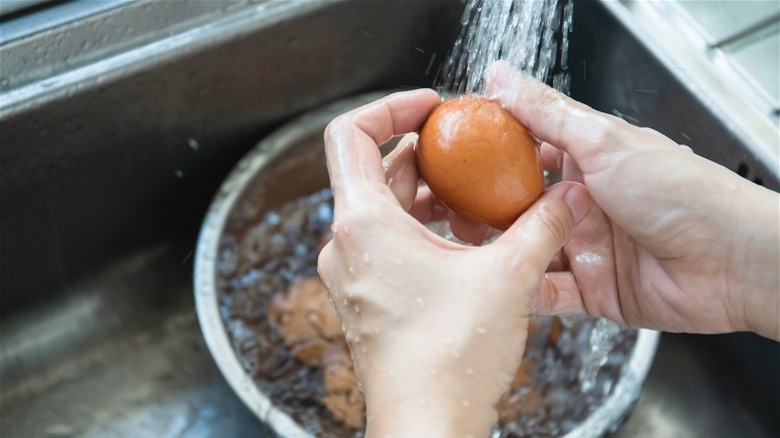The Easiest Way To Peel Hard-Boiled Eggs, According To Science
If you're reading this article, you probably enjoy eating eggs. And honestly, what's not to like? Not only do eggs provide your body with a powerhouse of essential vitamins, including vitamin A, vitamin B12, and choline, but you're also fueling yourself with 6 grams of protein with each egg you consume (per Healthline).
While there are so many amazing egg recipes out there, it can be discouraging to meal prep for a busy week and find yourself peeling more of your intended food than unnecessary shells. You're probably familiar with certain egg hacks, such as how to avoid that dreaded green ring that comes with overcooking hard-boiled eggs. But achieving that perfectly hard-boiled egg sans shell can be a true feat.
According to David Mogford of the Australian Egg Corporation, "any eggs a few weeks or less before the 'best before' date is good for hard boiling" (via HuffPost). Yet in recent years, some chefs have argued that, apart from age, the ease of peeling hard-boiled eggs comes down to timing and correct water temperature (per Serious Eats). So, is there a tried-and-true method of turning your past kitchen failures into real-life dreams that include easily peeled eggs?
The right way to peel hard-boiled eggs
To aid in that perfect peel, credible food experts might argue that hard-boiled eggs should be cooked straight from the fridge in boiling water (per Food52). Chef J. Kenji Lopez-Alt provides the science behind this process (via Food52), explaining that egg membranes stick more closely to the outer shell when slow-boiled.
Next in the perfectly peeled insurance policy is the egg ice bath. The polar plunge is not only useful in stopping your eggs from cooking but also allows their insides to set, making peeling a lot easier. There will also be fewer blemishes and holes in the final product when you peel your cracked eggs under running water (per Serious Eats).
In April, a similar method was demonstrated on TikTok by a middle school science teacher. She places a recently boiled egg in a bowl with cold water, puts a lid on the container, and vigorously shakes it for a few seconds. Afterward, she reveals the egg and slides the broken shell pieces right off.
According to Lopez-Alt, if you can afford to chill your eggs overnight, that will make for an even more successful peel attempt than the ice bath. With this tip in your back pocket, preparing eggs might be even better than it's cracked up to be.
Start with older eggs
When it comes to hard-boiling, does the age of your eggs really matter? According to Fine Cooking, an older egg's albumen (the white part of the egg) decreases with age. When hard-boiled, more space is created between the cooked insides and the hard exterior, making the eggs easier to peel.
While you can make some big mistakes when frying your eggs, using fresh ones isn't an issue. Egg freshness only plays a role when you're planning on hard-boiling your eggs. Egg expert David Mogford told HuffPost that fresher eggs tend to stick to the outer shells, making a clean peel more difficult.
Fine Cooking suggests waiting two weeks before using farm-fresh eggs for the hard-boil method. (If you're curious to know just old your eggs are you can always refer to an egg float chart to determine their estimated age.)
If you buy your eggs from the grocery store, age is one less thing to worry about, as most are sold to consumers in-store within a two-month range so they're ready to cook by the time you unpack your grocery bags (per the Farmers' Almanac). Whether you're buying your eggs from the farm or your nearest grocery store, older eggs are better when it comes to achieving that clean peel.
Use cold water
Now that you know to consider the age of your eggs before dropping them into a pot of boiling water, you may be wondering how crucial cold water is in the peeling process. Egg-obsessed chef J. Kenji Lopez-Alt explains at Serious Eats that both the shocking water method (placing eggs directly from boiled water into an ice bath) and the slower method of cooling by allowing eggs to chill slowly in the fridge, make for an easily peeled egg. With both methods, cold water is used to stop the cooking process and to firm up the interior of the egg.
The Kitchn, meanwhile, is a firm believer in the egg-shocking approach, claiming the fast cooling process causes the egg whites to shrink and separate from the sticky membranes. But Saveur notes that the longer you leave your eggs in cold water, the harder they are to peel. The outlet suggests peeling freshly boiled eggs as soon as they've cooled, starting at the wider end to allow running water to seep in and loosen the shell. As long as you're using cold water after boiling, you're setting yourself up for some easily peeled eggs.
While you may have made some mistakes cooking eggs in the past, peeling hard-boiled eggs will not be one of them in your future.



